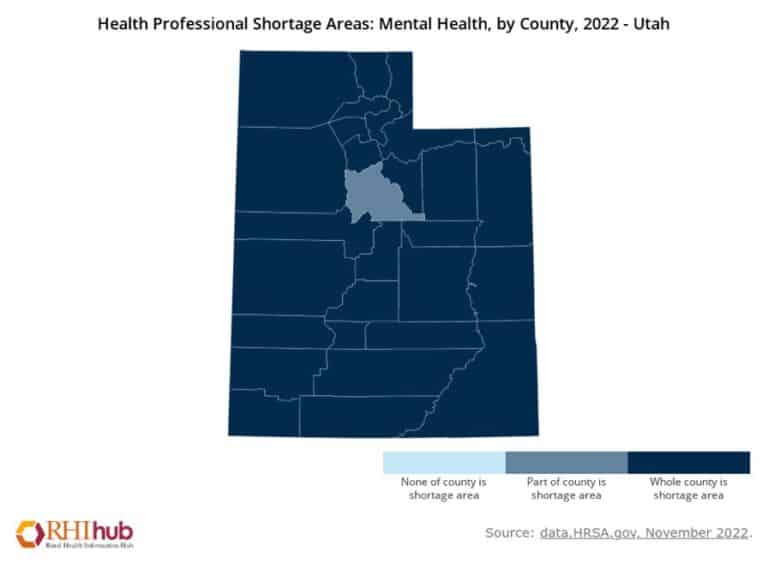
People need to see a therapist for many reasons, regardless of where they live. Therapy can help people cope with mental health issues such as depression, anxiety, trauma, stress, grief, addiction, etc. It can also help people improve their relationships, self-esteem, communication skills, and personal growth.
Therapy provides a safe and supportive space for people to express their feelings and thoughts, explore their challenges and goals, and learn new strategies and skills to overcome difficulties while enhancing their well-being.
Online therapy is a convenient therapy that uses video conferencing, phone calls, or text messages to connect a client with an online therapist. It’s an affordable and effective way for many to seek mental health support and solution-focused therapy.
Cost comparison between online therapy vs. in-person therapy
| BetterHelp | In-person therapy |
| Cost ranges from $65-$100 per week (you can message your therapist anytime) | $100 to $200 per session |
| $260- $400 monthly Get 15% off for Healthy Minded visitors |
Benefits of online therapy if you’re in Utah
Using online telehealth services in Utah may be especially helpful for people who live in rural areas or have difficulty driving to in-person therapy offices. The benefits of online therapy for these people are that it can:
- Save time and money by eliminating the need for travel and parking.
- Provide access to a wider range of therapists who may have more expertise or experience in specific issues or populations.
- Offer more flexibility and convenience by allowing people to schedule sessions at times that work best for them.
- Reduce barriers such as stigma, privacy concerns, or lack of transportation that may prevent some people from seeking help.
Drawbacks of online therapy
Of course, online counseling may not be suitable for everyone or every situation. Some possible drawbacks of online therapy include the following:
- It might not be covered by insurance or have different reimbursement rates than in-person therapy.
- Online therapy might not provide the same rapport, connection, or nonverbal cues as in-person therapy.
- It requires reliable internet access, devices, and software that some people may not have or know how to use.
- Sometimes online therapy isn’t appropriate for crises or severe mental illnesses that require more direct intervention.
These are just some examples of the pros and cons of online therapy in Utah. Ultimately, choosing online and other therapy options really depends on factors such as your family therapist’s preferences, needs, goals, and budget.
If you want online counseling, research different providers and compare their services and prices. You can also contact them directly and ask them any questions before scheduling your first therapy session. It’s also good to check with your insurance company to find out if they will cover your online therapy and ask them about their requirements.
Looking for a specialist? Match with a top-rated therapist.
Mental health in Utah
Living in Utah does not make someone immune to mental health issues or life challenges. In fact, some studies have shown that Utah has higher rates of mental illness and suicide than the national average.
A health report by NiceRX found that approximately 30% of people living in Utah suffer from mental health problems. This is the highest percentage reported in the U.S. In 2020, the suicide rate in Utah was also higher than the national average.
Some possible factors that may contribute to this include the following:
Utah’s high altitude
Utah’s high altitude and low oxygen levels may affect the brain’s serotonin levels and mood regulation, leading to higher rates of mental illness and suicide. High altitude is linked to an increased risk of depression and suicide, as the Harvard Review of Psychiatry reports. The same source found that high altitude can also make antidepressants less effective.
Utah’s cultural and religious factors
Utah’s cultural and religious expectations may create pressure and stress for some people who do not fit in or experience doubts or conflicts, making them less likely to seek help or talk about their emotions and mental health.
The struggle to balance mental health issues with the pressure to be active in one’s faith can also cause stress.
Utah’s lack of mental health resources and awareness
The shortage of licensed mental health professionals in Utah, especially in rural areas, may prevent some people from accessing quality care or finding a provider that matches their needs.
A lack of mental health education and awareness in Utah may contribute to stigma, discrimination, and misunderstanding about mental health issues and treatment options. This can prevent people from seeking help for their mental health concerns.
Utah’s seasonal changes and weather affect mood and energy levels
Utah has four distinct seasons with varying lengths of daylight and temperature. These changes can affect the circadian rhythm, the body’s internal clock regulating sleep and wake cycles. When the circadian rhythm is disrupted, it can cause mood swings, fatigue, insomnia, and other symptoms.
Winters in Utah are long and cold with less sunlight exposure. This can reduce the production of serotonin, a neurotransmitter that regulates mood, appetite, and sleep. Low serotonin levels can lead to depression, anxiety, irritability, and cravings for carbohydrates.
During the summer, Utah experiences hot and dry weather with high UV radiation. At this time of year, the UV radiation can be three times higher than in winter. It increases one’s risk of dehydration, heat exhaustion, sunburn, and skin cancer. These physical effects can also impact mental health by causing stress, discomfort, pain, and inflammation.
These are just some examples of how Utah’s seasonal changes and weather conditions may affect some people’s moods and energy levels. It is important to recognize that seasonal changes and weather conditions can impact mental and emotional health and take steps to cope effectively.
Some possible coping strategies are:
- Getting enough sleep and maintaining a regular sleep schedule.
- Exercising regularly and staying physically active.
- Eating a balanced diet rich in fruits, vegetables, whole grains, lean proteins and healthy fats.
- Avoiding alcohol, caffeine, nicotine, and other substances that can worsen mood or disrupt sleep.
- Seeking natural light exposure during the day or using artificial light therapy devices.
- Staying hydrated and avoiding extreme temperatures.
- Wearing sunscreen, sunglasses, a hat and protective clothing when outdoors.
- Seeking professional help if symptoms persist or interfere with daily functioning.
Lack of mental health professionals in Utah

The lack of mental health professionals in Utah, especially in rural areas, may prevent some people from accessing quality care or finding a provider that matches their needs. Here are some facts about Utah’s lack of mental health professionals.
- Utah has one of the highest proportions of its population living in mental health professional shortage areas (HPSAs), at 83.3%, meaning there are not enough providers per capita to meet the demand for mental health services.
- Utah’s urban areas have 171 mental health full-time equivalents (FTEs) per 100,000 people and 141 per 100,000 in rural areas.
- Utah’s large rural population faces additional barriers to accessing mental health care, such as long travel distances, a lack of transportation, limited broadband access, and higher poverty rates. The poverty rate in rural regions is 10.3%, while the rural rate in urban areas is 7%.
- Some mental health service providers may not accept Medicaid patients or practice in certain states. This is worsened by the expansion of the Medicaid program that adds more patients to a system where there already aren’t enough providers.

Examples of online therapy providers in Utah
Family Therapy provides online therapists and counselors for individuals, couples, and groups struggling with shame, fear, anxiety, or other challenges. You can schedule a session for $150 per session, or $200 for a couples session. They are located in American Fork.
PlushCare provides online therapy sessions for people in all U.S. states. They work in-network with most major insurance providers. You can schedule a free 15-minute consultation to meet possible therapists before committing to anything. PlushCare’s therapists are licensed to practice in Utah and can help you with stress management, relationship issues, self-esteem issues, and more.
Grace & Peace Christian Counseling is a counseling center offering online therapy for couples, individuals and families in Northern Utah who are looking for a more enjoyable, purposeful, and meaningful life. They support abuse, addiction, marriage and family issues, spiritual growth and more. They are located in Ogden.
EMDR and Counseling Center is a counseling center in Cottonwood Heights that offers online therapy using EMDR (Eye Movement Desensitization and Reprocessing), one of the top research-based trauma treatments in the world. They can help with mental health conditions such as trauma, anxiety, depression, self-esteem, body image, relationship, addictions, phobias, trust issues, and more.
S & S Counseling Services is a counseling center that offers online therapy for individuals and families who need support and strengthening. They provide counseling, education, and adoption services. They are passionate about marriage counseling and working with teens and young adults. They also help with family therapy, parenting skills, faith transitions, and more. They are located in Saint George.
How you can improve mental health resources and awareness in Utah

Educate yourself and others about mental health issues and treatment options. You can learn more about mental health from reputable sources such as the National Alliance on Mental Illness (NAMI), the American Psychological Association (APA), and the Substance Abuse and Mental Health Services Administration (SAMHSA).
Reduce stigma and discrimination by speaking up against myths and stereotypes about mental health. You can also share your own experiences or stories of recovery if you feel comfortable doing so.
Support mental health advocacy and policy change by contacting your local representatives, signing petitions, or joining campaigns that promote mental health funding, access, and quality.
Donate to or volunteer at mental health organizations or programs that provide services, support, or education to people with mental health needs. You can find some local organizations in Utah here.
Seek help for yourself or someone else if you notice signs of mental distress or illness. There are crisis intervention organizations that can help you. Call the National Suicide Prevention Lifeline at 1-800-273-8255 or text HOME to 741741 for free and confidential support. You can also use the SafeUT app to chat with a licensed crisis counselor or report a tip anonymously. There are also 24/7 anxiety hotlines you can use.
These are just some examples of how you can help improve mental health resources and awareness in Utah. By taking action, you can make a difference in your own life and the lives of others struggling with their mental health.
- The Best Cannabis Strains for Alleviating Anxiety - May 15, 2024
- How Psychologists Can Empower Communities - March 25, 2024
- The Potential of Medical Cannabis for Neurological Conditions - February 26, 2024